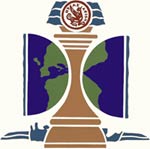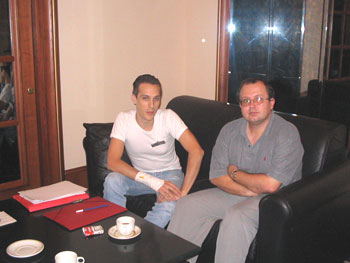| |
|
 |
|
Interview from Tibor Karolyi
By Kostas Klokas |
|
|
|

Tibor Karolyi (on the right) in the hall of the games |
ΚΚ. When have you started being a chess trainer?
TK. It was on 1989.
KK. As I‘ve seen in some notes that you have given
me your first pupil was Leko, is that right?
TK. Yes, exactly.
KK So, let’s start from this. Tell us some things
about Peter Leko of that period.
TK. We have been working with Peter from 1989 when he was 10 years
old. I estimate his level was 1900. He made 0 point out of nine in a
category III tournament. We stopped in October 1993 and by that time he
had 2 grandmaster norms and soon obtained 2555 Elo. Three months later,
he broke the record of the youngest grandmaster ever. In 1998 we started
to work together again and our work ended at the end of 2000.
KK What was your training schedule, how many hours
was he devoting in chess?
TK. We were working 6 hours a day. He was coming Mondays to Kecskemet
where I was living which was 80 km away from his home and he stayed
there till Saturday. Our schedule was from 8-12 and 2-4 every day.
KK And when was he going to school?
TK Well, he was only giving the exams and studying by himself the
appropriate period in order to continue working on chess. The same was
happening to many other great players like Judit for example.
KK. Which do you believe were the characteristics
that brought him so high?
TK. From very early stages he had a fully professional attitude, a
special memory and an amazing learning capability. The fact that he was
living by chess played a role too.
KK Can someone become GM only by hard work or is
the talent necessary?
TK Talent is surely necessary. Apart from this, in order to go high,
there are other important factors too. These are strong personality,
discipline, strong will, hard work for sure, a good environment
(opponents) and a trainer.
KK. I believe a trainer is very important. I’ve
never heard of a strong player without a trainer, right?
TK Well, strong players generally like toavoid to talk about their
trainers, they hardly mention them. In my book about Judit Polgar “The
princess of chess” I talk about this theme in details when I feature
Judit’s trainer of a formative period, Mr. Laszlo Hazai.
KK. Let’s return to Leko, and examine a little bit
the recent match he gave with Kramnik. In a discussion that I had the
honor to have with Mr Ivanchuk he told me that in the middle of the
match Leko played better but Kramnik played better at the end of the
match. Please, tell me your point of view.
TK In general I believe that it was a fair result. Neither of the
players was dominating and they must be very unsatisfied from their
performance in the opening with the white color. It was a failure of the
white pieces for both of them and the choices they made weren’t the
best. Better choices were made with black like the Spanish and the
Petroff.
KK. How do you explain the “accident” that Kramnik
had in the 8th game in the “Marshall”? They said that it’s possible he
hadn’t left the position in the computer to check it for the adequate
time in order to extract the appropriate conclusion.
TK. If he did this it was a terrible mistake in his preparation work.
But I also have my doubts that Leko did find the right continuation on
the board, I think it is quite possible he had prepared it until the
end. If he found it on the board then it was a big mistake of
preparation from his part as well.
KK. Let’s talk about something different. Do you
believe that chess is helping to become a better person?
TK. Yes. Chess helps to improve concentration, discipline, and
responsibility. On the other hand parents of teenage chess superstars
must be very alerted as the big media attention and early fees, being
out of children society can have a bad effect on their personality.
KK. Do you believe that there is a morality
reference among the top players of the world?
TK I don’t really know them so much personally, I can not express an
opinion on this. My opinion is that the few players who can attract
attention and who can afford it should pay more attention to promote our
game apart from just playing. They sometimes overdo professionalism.
KK Please, tell me your opinion about the level of
the organization of this world youth championships.
TK The organization is really very nice. The facilities and most of
all the place where the tournament is held in. Creta Maris hotel is
really wonderful both for this great conference center where the games
are played and all the surroundings. Something also important is how
fast the pairings are published. There is only a small critic I have as
a trainer. I believe that the double rounds and the free day system are
distracting the rhythm of the players and their preparation too. That
was the only thing which was better in Halkidiki.
KK. What do you think about these age group
tournaments in general?
TK. I have mixed feelings about it. I can only talk about the
categories in which my pupils participate. It looks like under 16 boys
many strong players from Halkidiki and Crete 2 years ago didn’t show up
this year. I believe that Fide and chess journalists should give more
rewards for the champions in order to encourage participation of the
very best juniors. One has to raise the question “is it worse to
organize under 18 and 20 world championships age groups when the best
players tend to ignore them which decreases the respect of the titles
they provide.
On the other hand, these championships give the chance to other players
to “appear”. I think that a world championship is a world championship
where the best players should participate. In any case, I think that
real world championship are from until the ages under 14 -maybe 16- and
this can be verified if someone checks the list of the world champions
of these ages of the previous years where one can find future world
class players and less so in the older age groups.
I would like also to comment something at this point. I think that there
is a paradox which had to do with the money given concerning the young
categories. It seems that it is given too much money and at the same
time no money at all. What I mean is that too much is spend on
accommodation fees and little money for training.
KK. And about the level of those who are here?
TK I believe that there is a step back generally in the former
eastern block countries, especially striking in the case of Russia and
also in countries like Hungary, Yugoslavia, the level of the juniors
sharply dropped. I believe that this is a result of the reduce quality
of the trainings. I get the impression that only some countries in
Caucasus are able to keep up the level. I realized this last year when
top juniors from the former Soviet Union weren’t able to play main
Sicilians but had to settle side lines as White.
ΚΚ It was very nice of you to have this
conversation. Thank you very much.
TK. You are welcome. |
|








